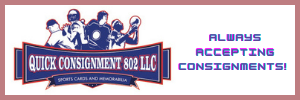
Law of Cards: UD Tries to Get Richard McWilliam Out of UD v UD Suit on a Technicality
Want to know why people hate lawyers? Because sometimes it seems they win cases through tricks rather than by dealing with the merits of the case.
The defendants are trying that now in the battle of the Upper Decks (the UD2 tour).
This week, counsel for the defendants (i.e., the attorneys for the U.S. Upper Deck and Richard McWilliam) moved to dismiss McWilliam from the case under Federal Rule of Civil Procedure 25(a)(1), which reads:
Substitution if the Claim Is Not Extinguished. If a party dies and the claim is not extinguished, the court may order substitution of the proper party. A motion for substitution may be made by any party or by the decedent's successor or representative. If the motion is not made within 90 days after service of a statement noting the death, the action by or against the decedent must be dismissed.
Legal translation: If a party in a lawsuit dies and a statement of that party's death is properly "served," a 90-day clock starts ticking. If the proper party (in this case, the estate of McWilliam) is not substituted into the case during those 90 days, the case against that party is over.
The basis of the defendant UDs' motion is that on February 14, they filed a document that stated, "Pursuant to Federal Rules of Civil Procedure, Rule 25(a), please take notice that Defendant Richard McWilliam died on January 5, 2013."
They say that constituted "service," and then they proceeded to let 90 days pass.
Because the plaintiffs did not move to substitute McWilliam's estate for McWilliam during that time frame, the defendants alleged the case should be over for McWilliam.
Sounds like trying to win on a technicality, right?
It’s amusing that while this plan sounds like it follows Rule 25 (and thus might work), the UD defendants might actually get tripped by a couple technicalities as well.
You see, "service" is required not only on the parties in the case (which is really all UD did), but also on any interested party. The UD defendants needed to also serve (and therefore identify to the plaintiff) the representative or successor who may be substituted as a party for McWilliam.
Legal translation: The UD defendants were required to "serve" the estate of McWilliam. There's no evidence on the record they did that.
This rule makes sense. Otherwise, it opens up the perfect chance for gamesmanship. If a defendant dies in a case, and the estate of the defendant wants to avoid any potential liability, heck, don't open the estate or appoint a representative until 91 days after telling the court about the death. That way, the other side can't substitute someone else into the case (because they don't know who to substitute), and the defendant wins.
It is also potentially amusing that some courts have commented that the UD defendants' procedure was wrong for situations like this. Why? Because the defense attorney's attorney-client relationship with McWilliam ceased at McWilliam's death.
Legal translation: An attorney's ability to act on behalf of his or her client ceases with the death of the client. After that, the attorney technically has no power to continue or terminate an action on his or her own initiative.
Technically, McWilliam's attorney is no longer his attorney…and there is no evidence of record that any of the attorneys in the UD2 tour represent McWilliam's continuing interests or his estate.
Because of this, there is no proof on the record that anyone involved in the McWilliam estate was informed about the law suit, or the 90-day period. Therefore, the defendants failed to "serve" as required by Rule 25.
This seems like a lot of what we in the legal biz call, “form over substance,” but since the UD defendants started this process based on alleged improper "form" by the plaintiffs, they can also lose in the some fashion.
To be fair, this is how I (and some courts) read the rules. If the judge reads the rules as I do, he will deny the motion, give the UD plaintiffs 30 days or so to substitute the correct party, and allow the UD Jerry Springer Experience to continue with all its original players.
Legal aside: Remember, the "Jerry Springer Experience" is the semi-court approved name for this case. Hey, maybe the court and I should go, get and share a trademark on that name. Everyone else in the industry is filing for trademarks. We should too!
Anyway --
It's hard to tell with 100% certainty if the judge reads the rules as I do. Since ambiguous rules like Rule 25(a)(1) are open to interpretation, he could let McWilliam out, which would be a big win for the defendants and their attorneys.
I wager, however, that a win like this will not be a big win for ALL lawyers. To the public, this will be another case where a party might win, not because they were judged to be innocent, but because their lawyers knew how to play the game better than their adversary's lawyers.
The information provided in Paul Lesko's "Law of Cards" column is not intended to be legal advice, but merely conveys general information related to legal issues commonly encountered in the sports industry. This information is not intended to create any legal relationship between Paul Lesko, the Simmons Browder Gianaris Angelides & Barnerd LLC or any attorney and the user. Neither the transmission nor receipt of these website materials will create an attorney-client relationship between the author and the readers.
The views expressed in the "Law of Cards" column are solely those of the author and are not affiliated with the Simmons Law Firm. You should not act or rely on any information in the "Law of Cards" column without seeking the advice of an attorney. The determination of whether you need legal services and your choice of a lawyer are very important matters that should not be based on websites or advertisements.
 | Making purchases through affiliate links can earn the site a commission |

































horn
Nobody is ever judged to be ‘innocent’ in a court of law. For Pete’s sake.